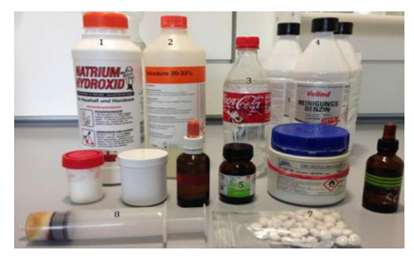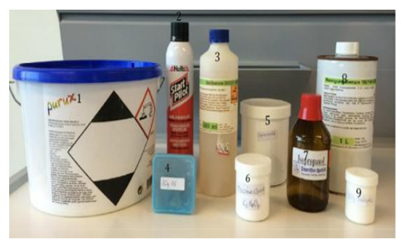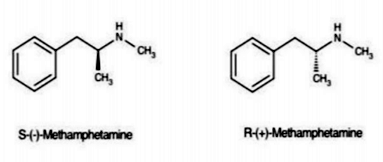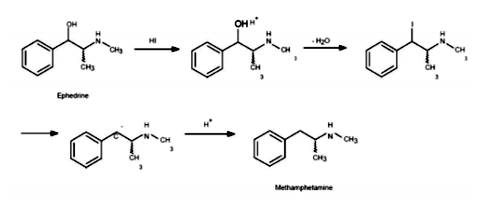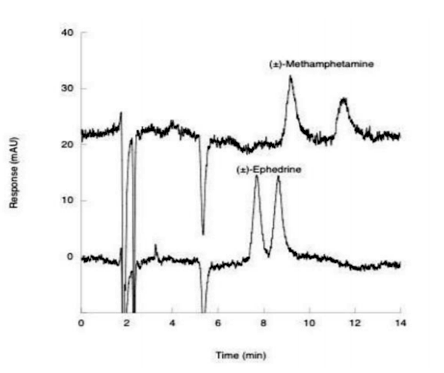Information
Journal Policies
Investigation of Two Seized Crystal Meth Labs in Austria - Parameters and Chirality Aspects of Methamphetamine Low Scale Synthesis
Jennifer A.Weiss1,Corinna Pertl1,Martin G.Schmid1*
Copyright :© 2018 Authors. This is an open-access article distributed under the terms of the Creative Commons Attribution License, which permits unrestricted use, distribution, and reproduction in any medium, provided the original author and source are credited.
N-Methamphetamine also known as “crystal meth” is a worldwide consumed illicit drug and represents a considerable problem for society. Market expands, consumption rises and manufacturing laboratories grow in number.
In Austria, clandestine laboratories were seized by police and the seized chemicals and materials of 2 labs were analysed in our lab. In the sequel, we tried to synthesize methamphetamine in small quantities with same chemicals as used in one clandestine laboratory.
Crystal was synthesized by two different synthesis routes, the moscow and the hypophosphorous route. Syntheses were carried out with extracted over the counter preparations to imitate conditions from clandestine laboratories. Products were analysed by GC-MS.
Methamphetamine production was successful when reduction of pseudoephedrine with iodine and hypophosphoric acid was done. The hypophosphorous route showed a yield of 28.3% ± 1.4% and purity of 90.5% when pseudoephedrine sulfate, extracted from Clarinase tablets, was used. In case of pseudoephedrine hydrochloride, exctracted from Reactine duo tablets, yield was 42.8% ± 4.0% and purity was 83%. To conclude, methamphetamine production is feasable with the instructions on the Internet and with the same chemicals, from the seized clandestine laboratory. This study is dedicated to Austrian public prosecutors and should provide useful information for them.
Keywords : N-methamphetamine, crystal meth; synthesis; reduction of ephedrine; clandestine laboratories, Forensic Science
1.Introduction
N-Methamphetamine (N-methylamphetamine) belongs to the phenylethylamine class and represents the N-methyl derivative of amphetamine [1]. Recently, also 4-methylamphetamine (4-MA) appeared on the drug market, which represents a new derivative of amphetamine, containing the methyl group in para posit ion of the phenylring instead of the N-position [2].
Among European countries, also in Austria methamphetamine is consumed and seizures by police as well as number of illegal production laboratories increase. Especially in the north of Austria methamphetamine is popular, because it is easily available from neighbouring countries. A lot of crystal is produced in Czech Republic, where more than 400 so called “kitchen labs“ were discovered. From Czech Republic the drug is smuggled across the border to Germany, Austria or Slovakia. This smuggling route into bordering countries is one of the main trafficking routes for “crystal meth“ in Europe. Controls of the drug trafficking are difficult, because they have to be cross-borders [3].
Besides the already mentioned countries, also Belgium, the Netherlands, Poland, Bulgaria, Hungary and the Baltic States have problems with methamphetamine production in clandestine laboratories and its consumption. Due to the European Drug Report, the drug is produced only for consumption in Europe and not for export into other countries, but there is high estimated number of undetected cases because of difficult controls [4].
Among others, police seized last year two different clandestine laboratories, chemicals are partially shown in Figure 1 and in Figure 2. During the first seizure, also a small amount of product was found, which was analysed by GC-MS. Originally, methamphetamine was used as medication for overweight people, people who suffer from narcolepsy and for people, who suffer from the attention deficit hyperactivity disorder [5]. During World War II the compound was administered to soldiers to fight their fatigue and fear as Pervitin.
Nowadays, methamphetamine is recreationally used on the drug market and has a huge popularity in television series and on the Internet. The compound has many different names as there are “speed“, “meth“, “glass“, “ice“ or “crystal ice“. The name “crystal“ emerged due to the crystalline structure of the hydrochloride salt of the compound, however, the free base of methamphetamine is liquid. The drug has appeared along with a lot of other new psychoactive compounds, which replace other already known and controlled drugs [6]. These new drugs have changed drug consumption behaviour during the past years [7].
Methamphetamine has a high addiction potential and a rapidly developed tolerance after frequent use. It is more potent than its chemically related analogue amphetamine. It can be smoked, injected, snorted or swallowed. The pills, which are ingested are known under the label “yaba“[8]. Negative side effects of methamphetamine can be hyperthermia [9], tremor, irregular heartbeat, high blood pressure, sweating, rapid breathing, anorexia, depression, psychosis, insomnia and fast aging of the body. The risk to develop other diseases or even to die e.g. due to heart attack or stroke is extremely high [10]; also disruptions of the blood brain barrier [11] are to be taken into account.
The neurotoxicity of methamphetamine due to its lipophilic nature is one of the biggest problems, because serotonin and dopamine neurons are damaged [12,13] which can lead to changes in brain structure [14,15]. Due to this fact, also psychiatric disorders can be evolved [16].
Furthermore, consumption can lead to an increase of violent behaviour [17]. Methamphetamine is a chiral compound, as a consequence two different enantiomers are possible, which is shown in Figure 3. Regarding chiral drugs, enantiomers may exhibit different pharmacological effects, whereas the eutomer is the effective isomer. In contrast, the distomer represents the enantiomer, which can be without effect, can cause unwanted side effects or even be toxic [18]. A suitable illustration in the context of chirality is amphetamine, where the S-isomer has stronger effects on the nervous system than the R-isomer [19,20].
Also in the case of methamphetamine the Sisomer has stronger psychostimulant effects than the R-isomer, because the R-isomer has a weaker pharmacodynamic profile and a longer half life. Both isomers have a high addiction potential and toxic effects at high doses. Illicit methamphetamine is sold as racemic mixture or as pure S-enantiomer as investigated and determined by Lee. et al and Jirovsky et al. who analysed seized methamphetamine samples [5,21].
Consumption of pure eutomers can cause overdose or even lead to lethal cases. Due to this fact, one aim of this work was to check the products of the synthesis concerning their enantiomeric composition. “Crystal Meth” is popular on the Internet, where a huge amount of information about effects, side effects and synthesis is available. Synthesis is represented as unproblematic and only slightly dangerous. The precursors are quoted and the facility of their acquisition is described. Mainly, Internet reports on two different synthesis routes, namely on reduction of ephedrine or pseudoephedrine with iodine and red phosphorous, the so called Moscow Route [22], or on the so called “Shake`n`Bake“method. Reduction of ephedrine derivatives can be performed with different chemicals, in our case by red phosphorous and iodine or by hypophosphoric acid and iodine.
The second popular route, the “Shake`n`Bake” route does not require any special equipment. It can be carried out in a bottle; by shaking the reaction takes place. No heating facility is required. This method is popular among producers in Europe and the United States. For this method only a small amount of ephedrine or pseudoephedrine containing tablets is necessary, which can be easily purchased despite prohibitions.
Also the plant Ephedra, which contains different alkaloids as for example ephedrine and pseudopehedrine can be, extracted [23]. Furthermore, lithium from batteries, ammonium nitrate from fertilizers or cold packs, water, a plastic bottle, isopropyl alcohol, a non polar solvent, iodine salt, concentrated hydrochloric acid and white gas are needed. This method is declared as easy and unproblematic, but in fact that is not true. Procedure is cheaper, smaller and faster than other methods, but more dangerous. Explosions during the shaking process and fires when mixing lithium with water may occur. Besides methamphetamine, also toxic waste is produced, which is not disposed properly and represents danger for environment, when e.g. thrown out of cars on highways [24].
Aside from these two synthesis routes also the “Emde“, which is a reduction in two steps via chlorephedrine, and “Nagai“ method, which is a reduction with red phosphorous and hydroiodic acid, are described [25].
In our study, methamphetamine was synthezised by two different synthesis routes, where methamphetamine was obtained through reduction of ephedrine or pseudoephedrine. Reduction was done either with iodine and red phosphorous or via iodine and hypophosphinic acid. The synthesized products were analysed concerning their purity and enantiomeric status. The two approaches were conducted with extracted over the counter preparations to imitate conditions from clandestine laboratories. Therefore, no optimizations of the synthesis parameters or conditions were done to check if the instructions from different internet forums are applicable.
2. Experimental
For this work research chemical, extracted chemicals from over the counter medicine and match sticks were used.
The used water was either distilled or of nanopure quality. Red phosphorous, iodine, ephedrine HCl, aqueous hypophosphinic acid (50wt%), sodium thiosulfate, toluene and sodium hydroxide solution were purchased from Sigma Aldrich Chemicals (St. Louis, MO, USA).
Potassium carbonate, acetone, methylene chloride, methanol, concentrated sodium chloride solution, concentrated sulfuric acid, potassium permanganate, sodium hydroxide and hydrogen peroxide were purchased from VWR (Darmstadt, Germany).
Clarinase medication (5 mg loratadin / 120 mg pseudoephedrine sulfate) and Betaisodona as iodine solution (100 ml contain 10 g povidon-Iodine complex) were ordered by Kwizda wholesale trade for pharmaceuticals (Vienna, Austria). Reactine duo tablets (5 mg Cetirizin dihydrochloride / 120 mg Pseudoephedrine hydrochloride) were seized by Police.
For this work, iodine was extracted from Betaisodona solution, pseudoephedrine HCl was extracted from Reactine Duo tablets and pseudoephedrine sulfate was extracted from Clarinase tablets. Red phosphorous was isolated from the striking surface of matchboxes. For extraction, the work of NicDaeid et al. [24] was followed. No details of the extractions or syntheses are described in this work, to prevent providing hints for drug production.
Commercially available Clarinase tablets were extracted with a mixture of ethanol and methanol (90:10% vol/vol). The theoretical yield for the 60 used Clarinase tablets would have been 7.2 g pseudoephedrine sulfate. 6.0 g of pseudoephedrine sulfate with pharmaceutical additives were isolated out of 60 clarinase tablets (52.8 g), which means a yield of 83.3%. Extraction of commercially available Reactine duo tablets was done accordingly. For 112 used Reactine duo tablets the theoretical yield would have been 13.4 g pseudoephedrine HCl. 8.8 g of pseudoephedrine hydrochloride and pharmaceutical additives out of 112 tablets (43.2 g) were isolated, which defines a yield of 65.5%. In both cases the yielded substances were dissolved in methanol and injected into GC-MS to check their identity and purity. Also two calibration curves were prepared by HPLC to define purity of the substances.
In the case of Clarinase tablets the purity of the extracted pseudoephedrine sulfate was about 29.6%. Purity of the received pseudoephedrine hydrochloride during the extraction from Reactine duo tablets was about 34.7%.
3. Synthesis Routes
For this work, two different synthesis routes for methamphetamine production were followed, namely the moscow route and the hypophosphorous route. Both routes were carried out with extracted substances from over the counter drugs. The products were then analysed by GC-MS and HPLC.
The moscow route
This synthesis route is a reduction of ephedrine HCl with iodine and red phosphorous, shown in Figure 4.
The hypophosphorous route
This route requires hypophosphoric acid instead of red phosphorous, general chemical reaction is shown in Figure 4.
1 mg of a synthesized substance was extracted with ethanol for analysis by GC-MS.
For gas chromatography an Agilent (Waldbronn, Germany) HP 6890 gas chromatograph coupled to an Agilent (Waldbronn, Germany) HP 5972 mass selective detector was used. A 30 m HP 5MS capillary column with an inner diameter of 0.25 mm and a 0.25 µm film thickness served as stationary phase.
Helium was used as carrier gas (5.5) with a constant flow of 0.8 ml/min. Injection was done automatically with a split ratio of 2.1 and with an amount of 1 µl. Temperature of the GC-MS interface was 280°C. Data collection was performed by scan mode with a range of 50-550 m/z starting 4 minutes after injection.
Temperature programme started at 50°C and then heated up to 310°C with a rate of 10°C/min (total run time: 27 min). MSD Chem Station Rev. E. 02.00.493 (Agilent Technologies, CA.USA) served for data analysis. With this method, it was clearly possible to distinguish between ephedrine and methamphetamine.
A HPLC of the HP 1100 series from Agilent (Waldbronn, Germany) equipped with a UV detector was used. As column served a Lichrospher100, RP 8, 5 µm. The mobile phase was a mixture of ammonium phosphate buffer (50 mM), pH 2.4 and acetonitrile (92:8).
Retention time of pseudoephedrine sulfate extracted from Clarinase tablets was 1.7 min and retention time of pseudoephedrine hydrochloride extracted from Reactine duo tablets was also found to be 1.7 min.
A calibration curve was prepared with the afore mentioned HPLC system to define purity of the obtained methamphetamine.
A HPLC of the HP 1090 series from Agilent (Waldbronn, Germany) equipped with a UV detector was used. As column, a Lichrospher 100, RP18 endcapped 5µm was used. The mobile phase was a mixture of water and methanol (97.5:2.5), pH 6.3 with 2% sulfated β-cyclodextrin [26].
The melting points were found to be at 167°C (HCl salt). Besides this, also solubility in different solvents was checked. Methamphetamine HCl was soluble in water, partly soluble in ethanol and not soluble in toluol and ether.
4. Results And Discussion
Methamphetamine is a representative of the global drug problem, which delivers severe consequences for society, public health and economic costs . On the Internet, various information about production, effects and types of consumption administration is available. There is much production of methamphetamine in illicit laboratories. The clandestine synthesis are done by reductive amination of phenyl-2-propanone, by hydrolysis of ephedrine, by leukart formamidation or by reduction of ephedrine with red phosphorous or hydroiodic acid [27,28]. Aside these synthesis paths also reduction of ephedrine with iodine and red phosphorous or a two step reduction via chlorephedrine are reported [22].
Also in Austria different clandestine laboratories were seized by police and chemicals were used for methamphetamine production with two of the above mentioned synthesis routes. One lab used the reduction of ephedrine with red phosphorous and iodine and the other lab used the so called “shake`n`bake” method, were lithium and ammonium nitrate are required.
Aim of this study was to compare the results of two different synthesis routes, namely the moscow and the hypophosphorous route, which are both routes for the reduction of ephedrine to methamphetamine. As educts, either over the counter medicine or research chemicals were used.
Figure 1 shows one of the seized clandestine laboratories. In this laboratory eight different important chemicals and precursors were found. First, sodium hydroxide (1) is needed to release methamphetamine as free base in its oily state. Concentrated hydrochloric acid (2) is used to form the hydrochloric salt of methamphetamine. Water (3) is required as solvent, white gas (4) is needed to extract the free base. Iodine (5) and red phosphorous (6) are used for reduction of ephedrine or pseudoephedrine. The tablets on the picture contain ephedrine, which is extracted as precursor for this synthesis.
The seized substance, which was found between cotton wool pads in the reactor syringe (8), was analysed by GC-MS; it showed a big peak of methamphetamine and a small peak of ephedrine.
Figure 2 illustrates the second seized clandestine laboratory. In this case other chemicals than in the above mentioned laboratory were used, which lead to the assumption that another synthesis route was used to produce methamphetamine.
Sodium hydroxide (1) is used to release methamphetamine as free base. Diethylether (2) and white gas (8) are required for free base extraction. Concentrated hydrochloric acid (3) forms the hydrochloric salt of methamphetamine. Ammonium nitrate (4,5) is an agent for hydrogenation. Ascorbic acid (6), serves as reducing agent. Isopropanol (7) is a solvent for the extraction ephedrine in tablets. White gas (8) is a solvent for free base extraction. Iodine (9) is for the production of hydroiodic acid, which is an important reagent.
No synthesized methamphetamine was seized in this laboratory, but it was obvious that the chemicals were intended for methamphetamine production. Also, lithium from batteries was used for the synthesis of methamphetamine. Overall, it is assumed that methamphetamine was synthesized by the “shake`n`bake“method.
Besides these seizures of two illicit drug laboratories and the determination of the chemicals purposes, two different synthesis routes were conducted to examine if the synthesis of methamphetamine with the chemicals of the first clandestine laboratory is feasible.
For this approach, ephedrine, iodine and red phosphorous were used. Also after several attempts, the moscow route conducted with extracted precursors from over the counter preparations under clandestine laboratory conditions did not yield to methamphetamine. However, reaction parameters were not optimized.
Synthesis via hypophosphorous route was successful. When pseudoephedrine sulfate, extracted from Clarinase tablets, was used yield was 28.3% ± 1.4%, with a purity of 90.5%. 60 Clarinase tablets resulted in 6 g pseudoephedrine sulfate with a purity of 29.6%. With these extracted 6 g pseudoephedrine sulfate it is possible to synthesize 1.2 g methamphetamine HCl with a purity of 90.5%. The used 60 Clarinase tablets resulted in 0.87 g of pure methamphetamine free base. The limit quantity of methamphetamine free base, which is predefined by law, is by 10 g. To achieve 10 g of the free base about 700 Clarinase tablets would be needed.
In case of pseudoephedrine hydrochloride, exctracted from Reactine duo tablets, the yield was 42.8% ± 4.0% and the purity was 83%. 112 Reactine duo tablets resulted in 8.8 g pseudoephedrine chloride with a purity of 34, 7%. With these extracted 8.8 g pseudoephedrine chloride synthesis of 3.52 g methamphetamine HCl with a purity of 83% is feasable. The applied 112 Reactine duo tablets lead to 2.35 g of pure methamphetamine free base. To reach the limit quantity of 10 g about 480 Reactine duo tablets would be required.
This information might be useful for police and public prosecution authorities during seizures and trials. The achieved purity might be enhanced by recrystallization, which may result in bigger crystals. This was not checked because of low amounts used.
For enantiomer purity check the synthesis routes were conducted with research chemicals too, because the used pills for extraction did not contain ephedrine or pseudoephedrine as a racemic mixture. The formed methamphetamine was also tested for its enantiomeric purity by HPLC with the use of a Lichrospher 100, RP18 endcapped, 5µm column, findings are illustrated in Figure 5. When ephedrine was used as a racemic mixture, the resulting methamphetamine turned out to be also a racemate.
However, when an enantiomer of ephedrine was used the corresponding product was enantiomerically pure. The stronger effective enantiomer of methamphetamine, the (+)-enantiomer is formed by (-)-ephedrine. These findings are in good accordance with those published by Schmidt [29].
5. Conclusion
Methamphetamine plays a significant role in todays drug consumption behaviour. Production in clandestine laboratories, consumption, number of addicts and police seizures in this context increase. Methamphetamine nowadays a popular drug, due to its effects and its appearence in TV shows and on the Internet in different online forums The instructions for its production are illustrated on the Internet and represented as harmless. Because of these facts, the aim of this research was to investigate two different seized illicit drug production laboratories and to check if synthesis of methamphetamine with the same chemicals, which were used in one Lab is possible. The compared synthesis routes resulted through reduction of ephedrine or pseudoephedrine in methamphetamine. Using the hypophosphorous route, methamphetamine was produced with all used precursors successfully. However, the moscow route showed the limitation that only lab chemicals synthesis was successful. When extracted pills were used, no reaction to methamphetamine took place. Parameters of the synthesis were not improved and altered, because one of the intentions of the study was to produce it in the same way as clandestine producers do.
The seized substance from the illicit laboratory # 1 was identified as methamphetamine with traces of ephedrine. It leads to the assumption that presence of ephedrine would not be recognized by consumers, because the compounds have similar chemical structures and similar effects on the human body and mental health.
For the future it will be challenging to observe how the European methamphetamine problem is going to evolve. This study is intended to provide information for Austrian public prosecutors and is dedicated to them.
References
- Stojanovska N., Fu S., Tahtouh M., Kelly T., Beavis A., Kirkbride K.P., A review of impurity profiling and synthetic route of manufacture of methylamphetamine, 3,4-methylenedioxymethylamphetamine, amphetamine, dimethylamphetamine and p-methoxyamphetamine. Forensic Sci. Int. 224 (1-3), 8 (2013).
- Checkit!, 2017. Available at: http://checkit.wien/substanzen/methamphetami n/ (accessed 16 Dec 2017).
- EMCDDA. Methamphetamine. A EuropeanUnion perspective in the global context. EMCDDA-Europol joint publications. 2009. Availableat: http:// www.emcdda.europe. eu/attachements.cfm/att_82097 _EN_Methamphetamine_final.pdf (accessed 16 Dec 2017).
- European Drug Report 2017. European Monitoring Centre for Dugs and Drug Addiction. Availabale at: http://www.emcdda.europa.eu/edr2017_en (16 Dec 2017).
- Jirovsky D., Lemr K., Sevcik J., Smysl B., Stransky Z., Methamphetamine-properties and analytical methods of enantiomer determination. Forensic Sci. Int. 96(1), 61 (1998).
- Gine C.V., Espinosa I.F., Vilamala M.V., New psychoactive substances as adulterants of controlled drugs. A worrying phenomenon? Drug Testing and Analysis, 6(7-8): 819 (2014).
- Fast D., Kerr T., Wood E., Small W. The multiple truths about crystal meth among young people entrenched in an urban drug scene: a longitudinal ethnographic investigation. Social Science & Medicine, 110, 41 (2014).
- Verachai V., Rukngan W., Chawanakrasaesin K., Nilaban S., Suwanmajo S., Thanateerabunjong R., et al. Treatment of methamphetamine-induced psychosis: a double-blind randomized controlled trial comparing haloperidol and quetiapine. Psychopharmacology, 231(16), 3099 (2014).16
- Molkov Y.I., Zaretskaia M.V., Zaretsky D.V. Meth math: modeling temperature responses to methamphetamine. American journal of physiology. Regulatory, integrative and comparative physiology, 306(8), R552 (2014).
- Jones H.E., Myers B., O'Grady K.E., Gebhardt S., Theron G.B., Wechsberg W.M. Initial feasibility and acceptability of a comprehensive intervention for methamphetamine-using pregnant women in South Africa. Psychiatry J., Article ID 929767, 8 pages http://dx.doi.org/10.1155/2014/929767 (2014).
- O'Shea E., Urrutia A., Green A.R., Colado M.I. Current preclinical studies on neuroinflammation and changes in blood-brain barrier integrity by MDMA and methamphetamine. Neuropharmacology, 87, 125 (2014) .
- Zheng T., Liu L., Shi J., Yu X., Xiao W., Sun R. The metabolic impact of methamphetamine on the systemic metabolism of rats and potential markers of methamphetamine abuse. Molecular Biosystems, 10(7) 1968 (2014).
- Halpin L.E., Collins S.A., Yamamoto B.K. Neurotoxicity of methamphetamine and 3,4- methylenedioxymethamphetamine. Life Sciences, 97(1), 37 (2014).
- Lin J.F., Lin Y.H., Liao P.C., Lin Y.C., Tsai T.F., Chou K.Y., Induction of testicular damage by daily methamphetamine administration in rats. Chinese Journal of Physiology, 57(1), 19 (2014).
- Courtney K.E., Ray L.A. Methamphetamine: An update on epidemiology, pharmacology, clinical phenomenology, and treatment literature. Drug Alcohol Dependence, 143C, 11 (2014).
- Akindipe T., Wilson D., Stein D.J. Psychiatric disorders in individuals with methamphetamine dependence: prevalence and risk factors. Metabolic Brain Disease, 29(2), (2014).17
- McKetin R., Lubman D.I., Najman J.M., Dawe S., Butterworth P., Baker A.L., Does methamphetamine use increase violent behaviour? Evidence from a prospective longitudinal study. Addiction, 109(5), 798 (2014).
- Gübitz G., Schmid M.G., Chiral separation by chromatographic and electromigration techniques. A review. Biopharmaceutics and Drug Disposition, 22(7-8), 291 (2001).
- Lekskulchai V. Isomeric separation of methamphetamine by HPLC chiral column. Journal of the Medical Association of Thailand, 84(11), 1604 (2001).
- Rasmussen L.B., Olsen K.H., Johansen S.S., Chiral separation and quantification of R/S-amphetamine, R/S-methamphetamine, R/S-MDA, R/S-MDMA, and R/S-MDEA in whole blood by GC-EI-MS. J. Chromatogr. B, 842(2), 136 (2006).
- Lee J.S., Yang W.K., Han E.Y., Lee S.Y., Park Y.H., Lim M.A., Monitoring precursor chemicals of methamphetamine through enantiomer profiling. Forensic Sci. Int., 173(1), 68 (2007).
- Lee, J.S., Han, E.Y., Lee, S.Y., Kim, E.M., Park, Y.H., Lim, M.A., et al. Analysis of the impurities in the methamphetamine synthesized by three different methods from ephedrine and pseudoephedrine. Forensic Sci. Int., 161(2-3),209 (2006).
- Barker W.D., Antia U., A study of the use of Ephedra in the manufacture of methamphetamine. Forensic Sci. Int., 166(2-3), 102 (2007).
- News NYD. New "shake-and-bake"method for making crystal meth gets around drug laws but is no less dangerous. 2009; Available at: http://www.nydailynews.com/life-style/health/ new shake and nake method making crystal methdrug laws no dangerous article1.39742 (accessed 16 Dec 2017).
- NicDaeid N., Jayamana S., Kerr W.J., Meier-Augenstein W., Kemp H.F., Influence of precursor solvent extraction on stable isotope signatures of methylamphetamine prepared from over-the-counter medicines using the Moscow and Hypophosphorous routes. Anal. Bioanal. Chem. 405(9), 2931 (2013).18
- Taschwer M., Seidl Y., Mohr S., Schmid M.G., Chiral separation of cathinone and amphetamine derivatives by HPLC/UV using sulfated beta-cyclodextrin as chiral mobile phase additive. Chirality, 26(8), 411 (2014).
- Skinner H.F., Methamphetamine synthesis via HI/red phosphorous reduction of ephedrine. Forensic Sci. Int., 48, 128 (1990).
- Windahl K.L., McTigue M.J., Pearson J.R., Pratt S.J., Rowe J.E., Sear E.M., Investigation of the impurities found in methamphetamine synthesised from pseudoephedrine by reduction with hydriodic acid and red phosphorus. Forensic Sci. Int., 76(2), 97 (1995).
- Schmidt E. Über das Ephedrin und Pseudoephedrin. Archiv der Pharmazie, 252(1-2), 89(1914).





